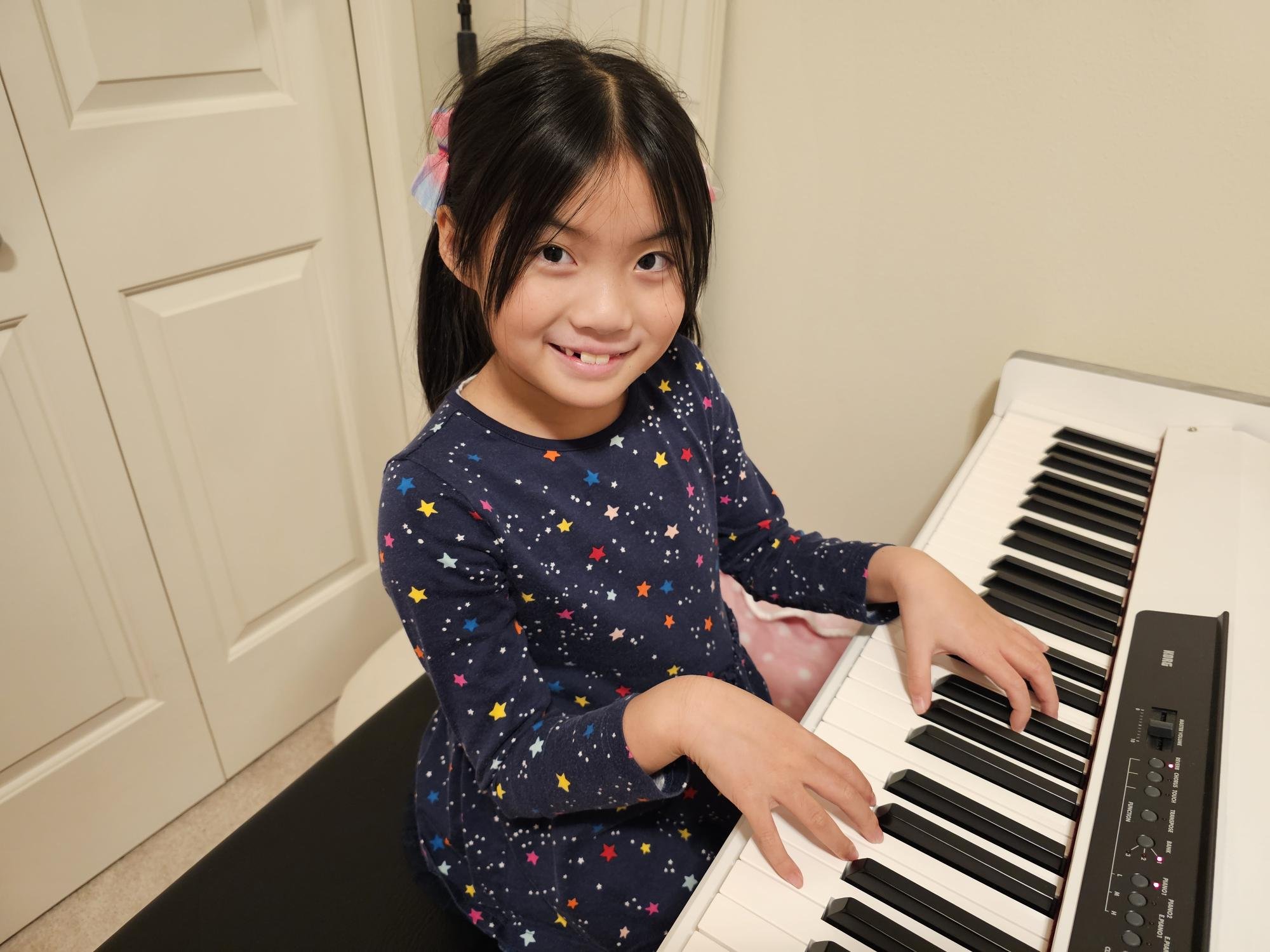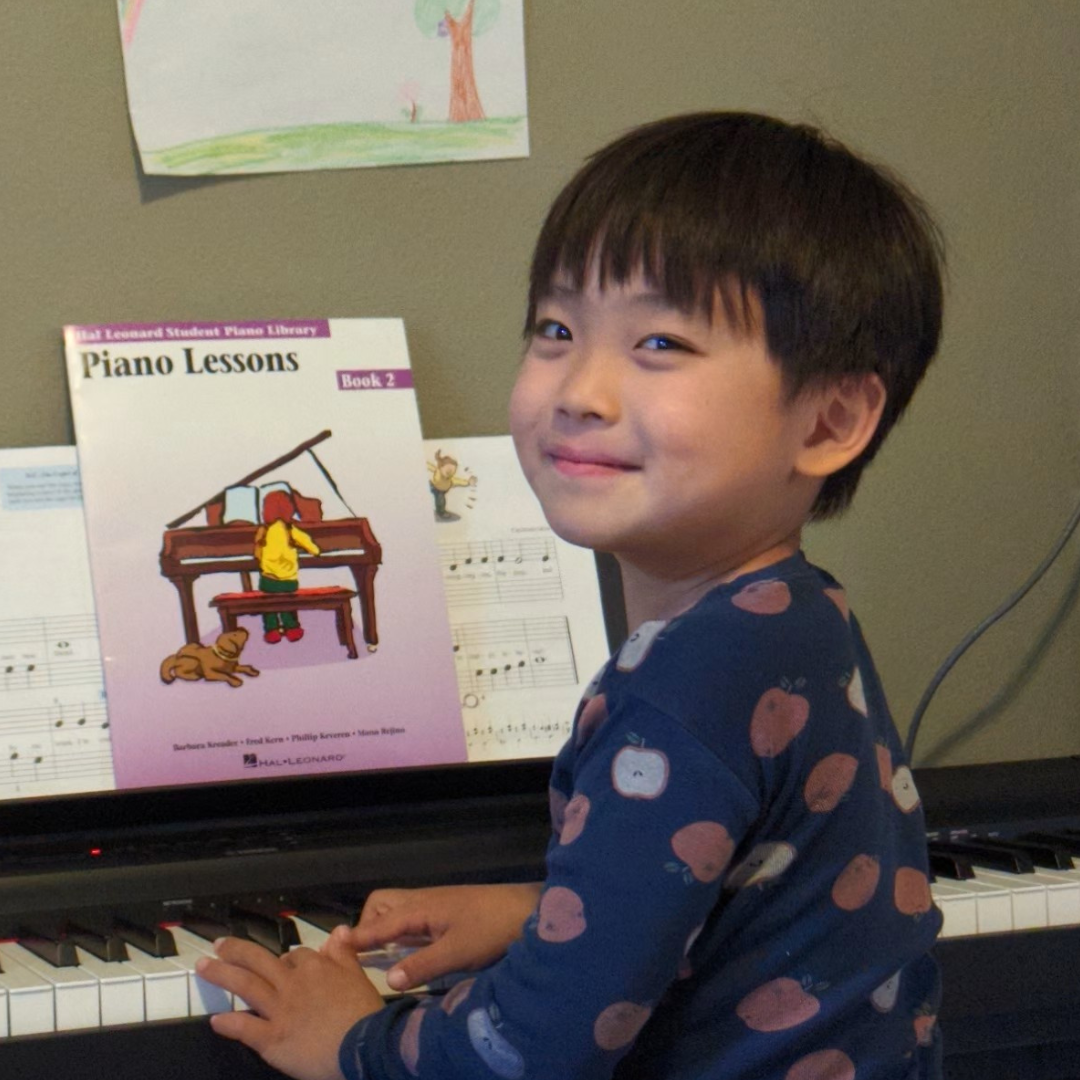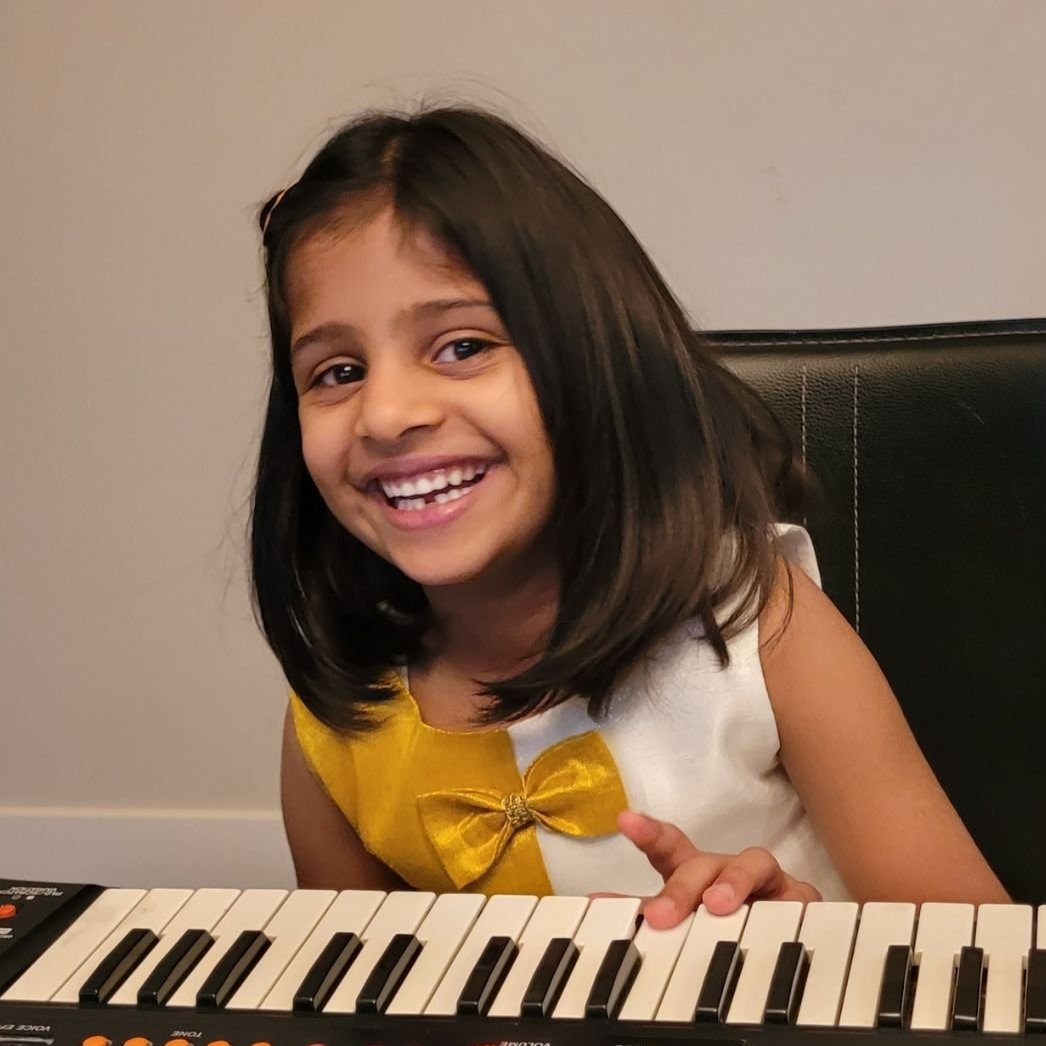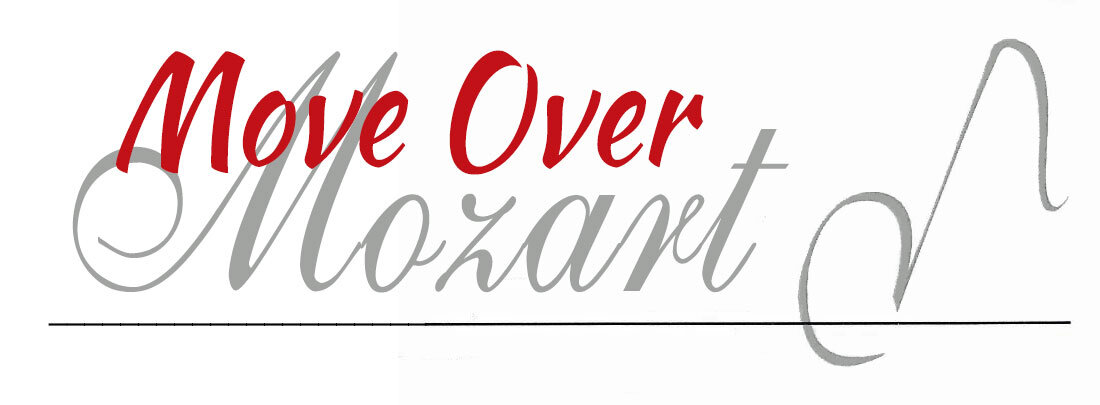




FAQ
-
Our piano lessons use a variety of methods for a comprehensive learning experience:
Kodály Rhythm: Syllables for rhythmic notes ("ta" for quarter notes).
Ear-Training: Recognizing notes and patterns by listening.
Solfeggio: Syllables for scale tones (Do, Re, Mi) with a movable "Do."
Color-Coding: Colors for keys and finger placements.
Hal Leonard: Easy-to-follow method for beginners.
Robert Pace, Music for Piano: For older students, focusing on pattern recognition and transposing.
Learning Through Fun: Interactive games and activities.
For more details, visit our lesson overview page HERE.
-
When a child begins piano lessons, establishing a regular daily practice routine is crucial. Here’s what we recommend:
Daily Routine: Make practice a daily habit, focusing on consistency.
Set a Schedule: Pick a consistent "piano time" that fits your child's routine.
Flexible Practice: Let your child play anything for any length of time during "piano time."
Encourage Enjoyment: Make piano playing fun and enjoyable, integrating it into their daily life.
-
For children ages 3-5, piano practice can be a little different compared to an older student. Here’s what to expect:
Exploring Sounds: Kids will enjoy making various sounds on the piano.
Imitation and Pretend Play: They may pretend to be performers or composers, imitating songs they like.
Discovery: They'll learn which notes sound pleasant and how to control notes with their fingers.
Simple Practice: Playing their lesson song once or twice a day is sufficient.
Creative Play: Encouraging them to create their own music fosters a love for learning.
At this age, making music fun and engaging is key to developing their interest and skills.
-
Keeping your child motivated through fun activities is our brand! Here are some tips to keep daily practice interesting:
Short, Frequent Sessions: Practice several times a day for shorter periods.
Repetition: Play each song or section at least three times in a row.
Slow Practice: Practice slowly to play perfectly.
Break It Down: Divide harder pieces into smaller sections.
Set Goals: Have a specific goal for each session.
Special Time: Make practice a special one-on-one time with a parent.
Positive Approach: Never use practice as a punishment.
Live Music: Listen to live music whenever possible.
Recordings: Listen to recordings of current and future music, including jazz or classical piano.
Metronome: Use a metronome during practice.
Self-Critique: Record and review practice sessions.
For more tips, check out our newsletters here.
-
Most likely the equipment needed you already have!
Computer or tablet/ipad work best.
Internet connection with at least 5 Mbps upload and 25 Mbps download speed
Keyboard or piano with standard-sized keys
Table or stool to hold your camera device to show your child and their hands on the keyboard
-
Yes and no. Keyboards are fantastic for beginners due to their affordability, portability, and minimal maintenance. They also come with useful features that can make practice fun. However, as your child advances, a keyboard will not provide the same touch sensitivity and dynamic range as an acoustic piano, which is crucial for developing proper technique. While it's perfectly fine to start with a keyboard, planning to transition to an acoustic piano will help your child grow and refine their skills in the long term.
General Questions
-
Our Crescendo Kids class, designed for six students of similar age and ability, is a 30-minute session divided into three main sections:
Group Activity: Learn a music theory concept through interaction with other students and the teacher.
Individual Activity: Work on a worksheet or theory game independently.
One-on-One Piano Time: Each student has individual time with the teacher at the piano. For ages 5 and older, this is followed by practice time at a second piano to apply what they just learned.
-
Our in-person classes excel at fostering a fun and engaging learning environment, even without a home piano. While practice at home is definitely recommended, it's not required. Our classes adapt to each child's pace, ensuring everyone thrives, regardless of practice time.
-
No worries, parents! Young learners benefit most from focused teacher attention, which ensures proper technique and avoids distractions. For older students (ages 5+), we add a practice keyboard so they can apply what they've learned immediately. We prioritize quality learning over the number of keyboards!
-
This class is designed for children to participate on their own. The material is age-appropriate, and the teacher will assist if needed. Our classrooms have large windows so parents may watch while still being outside the classroom.
-
We cannot offer make-up classes since each session is tailored to specific students. However, your child's teacher will help them catch up on missed concepts when they return. You can also submit recordings and contact the teacher through the practice app for extra help. Additionally, our piano parties provide a great way to get extra "lessons" for free.
-
In our 30-minute Crescendo Kids Classes, each child enjoys one-on-one time at the piano with the teacher, along with group and individual activities. This balanced approach reinforces both piano and music theory skills, ensuring a well-rounded learning experience.
-
Our classes are for children only, and parents are asked to wait outside.
If you’re interested in learning piano, we offer online private lessons for all ages and abilities. It’s a great way to learn alongside your child!
Crescendo Kids Classes (in-person)
-
Traditionally, experts have said age 9 is the best age because their maturity is ready for the intense one on one lesson and they have the stamina to practice daily. This is why most instrumental programs start in 4th or 5th grade in elementary schools. Move Over Mozart students have been ready to transition to private lessons by age 8 and sometimes even age 7.
-
Many children are interested in playing an instrument, but the structure of private lessons is not conducive to their learning. That is why we created Crescendo Kids. This allows young children to learn piano, learn some basics of music theory, and have a strong foundation before starting the intensity required in private lessons. Here are some signs to look for to know when your child will be successful in private lessons.
Do you have a piano or its equivalent at home? While a keyboard is great for getting started with lessons, there are many playing techniques that are just not possible on keyboards and digital pianos. At the very least, you will need a keyboard with all 88 keys. Not only does this help with orientation, but many pieces require the lower and upper octaves. Also, playing the piano is more than just hitting the right notes. How you touch the keys makes a huge difference and takes practice to perfect. One of the simplest techniques is to play legato (smooth and connected) versus staccato (short and detached). Many keyboards and digital pianos do not have the preciseness needed to separate how striking the key differently will make a difference in sound. If you are paying for private lessons, you will need your child to have an adequate instrument to practice on at home.
Is your child practicing daily? Private lessons require an intensity that many young children are just not ready for. Many private teachers require 30 minutes of practice at least 5 days a week. This is the MINIMUM. For most young children, this is too much.
Is your child reading notes on the staff? Although private teachers will teach this, because of interactive setting, Crescendo Kids is able to play many theory games to reinforce some of these basic concepts. This will give your child a strong foundation of how to read music and how notes move on the staff.
Is your child at least 8 years old and in 3rd grade? Although there are some private instructors that will take students at a younger age, this is the ideal age to start private lessons because the student has matured to a level where private lessons can be enjoyable.
Has your child progressed faster and farther than the material and curriculum that Crescendo Kids provides? Crescendo Kids has many levels for lessons. Occasionally there will be a child that we believe would learn better in the private setting, but the interactive and group setting is very favorable to learning music, especially for young children.
Move Over Mozart offers online private piano lessons. If you are still interested in pursuing private lessons, talk to your teacher or send me an email.
Online Private Piano
-
Our recitals are fun, relaxed events where kids can share their music with family and friends. We host three main recitals each year—End of Summer, Winter Holidays, and Spring. All recitals are live-streamed, so friends and family can join from anywhere. It’s a great way for your child to gain confidence and enjoy performing!
-
Recital pieces will be chosen a few weeks before the recital. An assignment titled, "Recital Songs" will be in your child's lessons on the practice app. This is where you can find which pieces your child chose to perform.
-
While our piano teachers are preparing students for the recital, here are some additional ways you can support your child at home:
Practice Regularly: Familiarity with their piece will help your child feel more comfortable and relaxed during the recital.
Memorize the Piece: Although not required, memorizing the song can boost your child's confidence.
Mini-Recitals: Encourage your child to perform for family or friends to become comfortable playing in front of others.
For the Spring Recital, specifically:
Practice on an Acoustic Piano: If possible, have your child play on an acoustic piano once or twice to get used to its unique feel, especially since they will be performing on a concert grand piano.
-
The Spring Piano Recital will be held at the Lendemain Clubhouse, located at 14901 123rd Ave NE, Kirkland.
Important: Please use the directions below, as some GPS and online maps may be incorrect.
From I-405, take exit #22 and go EAST.
Turn RIGHT onto 124th Ave NE, just past Woodmoor Elementary.
Turn RIGHT onto NE 149th Ave into the Lendemain neighborhood.
The clubhouse will be directly in front of you at the "T". You will see the wooden walkway, but the building is mostly hidden behind trees.
We look forward to seeing you there!
-
Yes, your child needs to be currently enrolled in piano lessons to participate in the Spring Piano Recital. During the Spring session, we prepare students for the recital by selecting a song and practicing performance etiquette.
Register early to secure a spot! If the class fills up, add your child's name to the waitlist, or consider our online classes. We prioritize making room for returning students on waitlists.
Exception: If your child is taking piano lessons elsewhere, provide us with their teacher's contact information to ensure proper preparation. We love having former students perform at the recital! Contact us if you have any questions.
-
There is no dress code for the Spring Piano Recital. While our teachers will dress formally or semi-formally, your child should wear whatever feels most comfortable. The goal is for everyone to have fun.
Feel free to dress up, but it's not required! Comfortable clothes are perfectly fine if dressing up will stress your child. Let’s focus on enjoying the music and having a great time!
Recitals
Let's Get Started
STEP 1
Schedule Introductory Meeting
Chat with our Director, Pamela Cornell.
See a demo of the practice app and how online lessons work.
Find the perfect program for your child.
STEP 2
Discover & Join a Program
Easy and parent-friendly signup process.
Month-to-month lessons with no hidden fees or contracts, no annual material fees, and semester minimums.
STEP 3
Watch Your Child Blossom!
See your child gain confidence and skills with our engaging lessons.
Plus, they can perform in our fun recitals!




